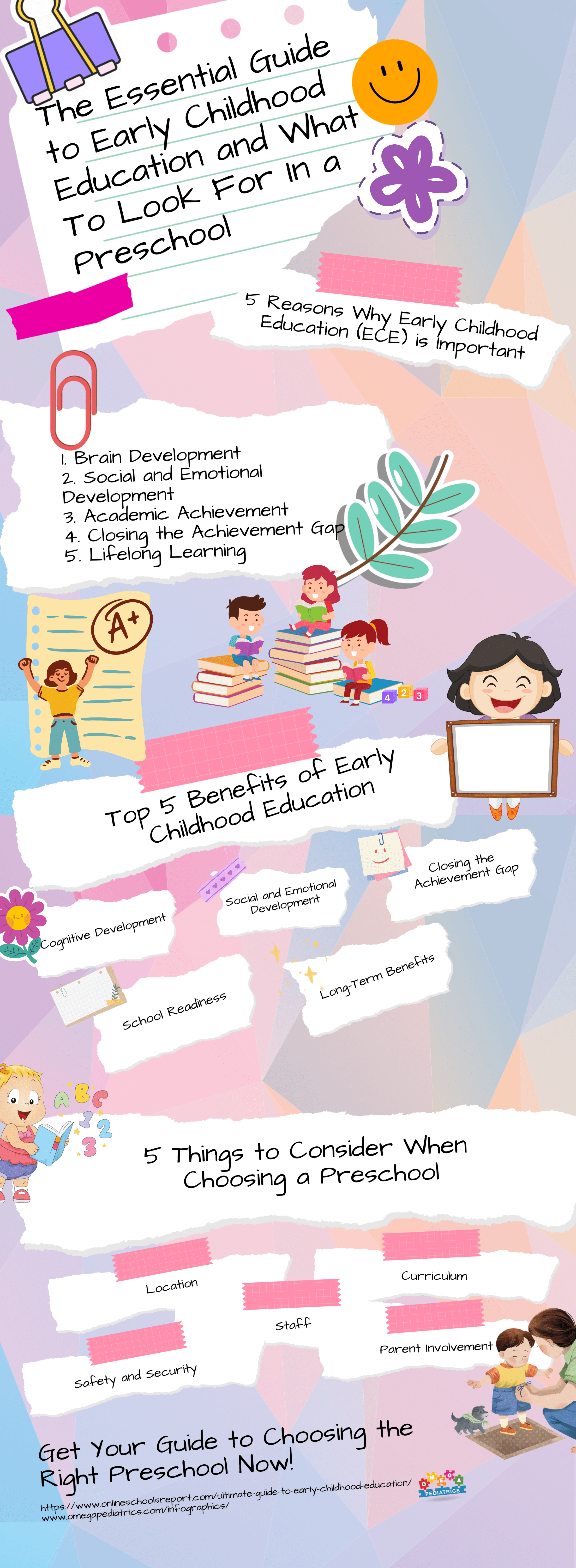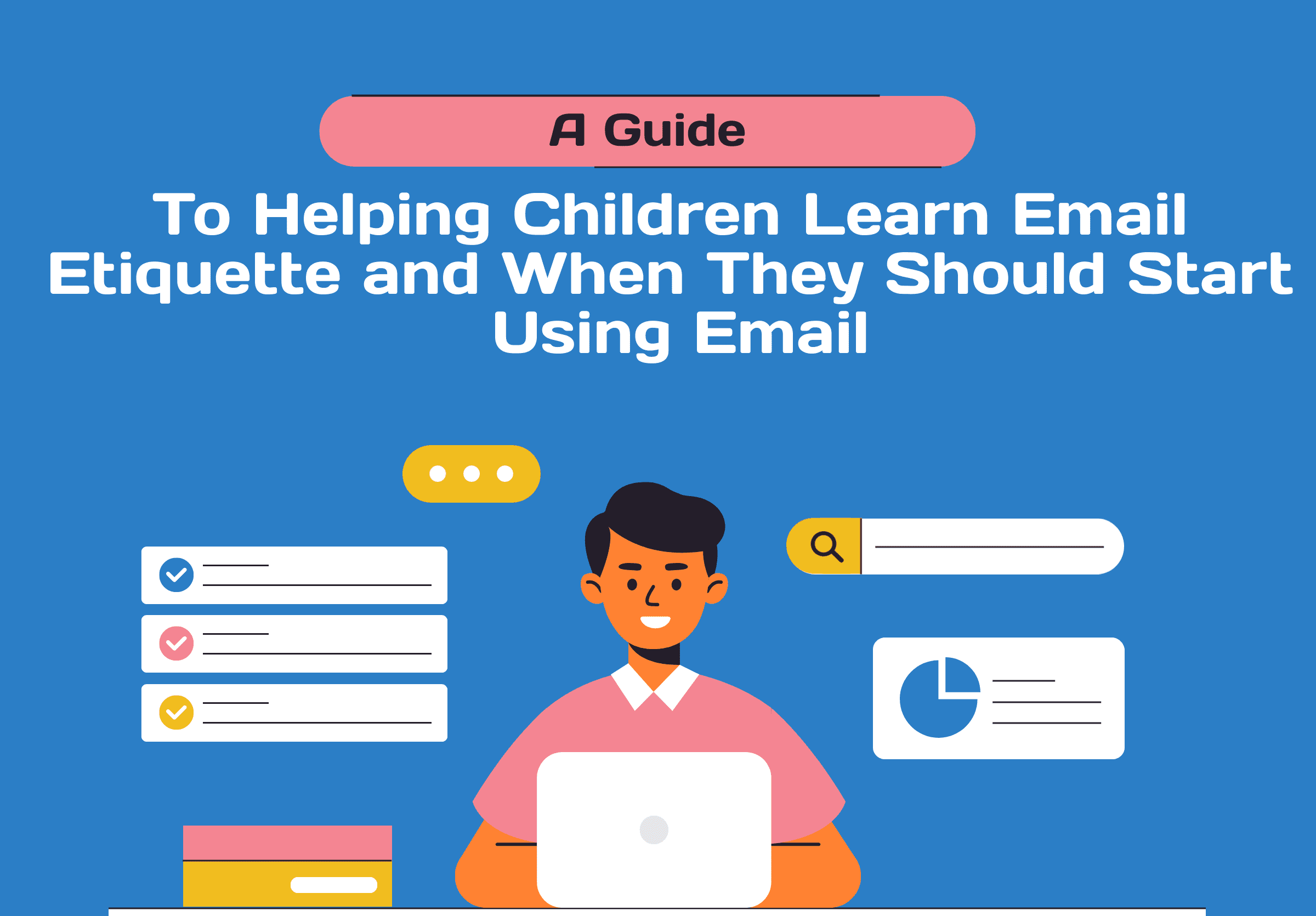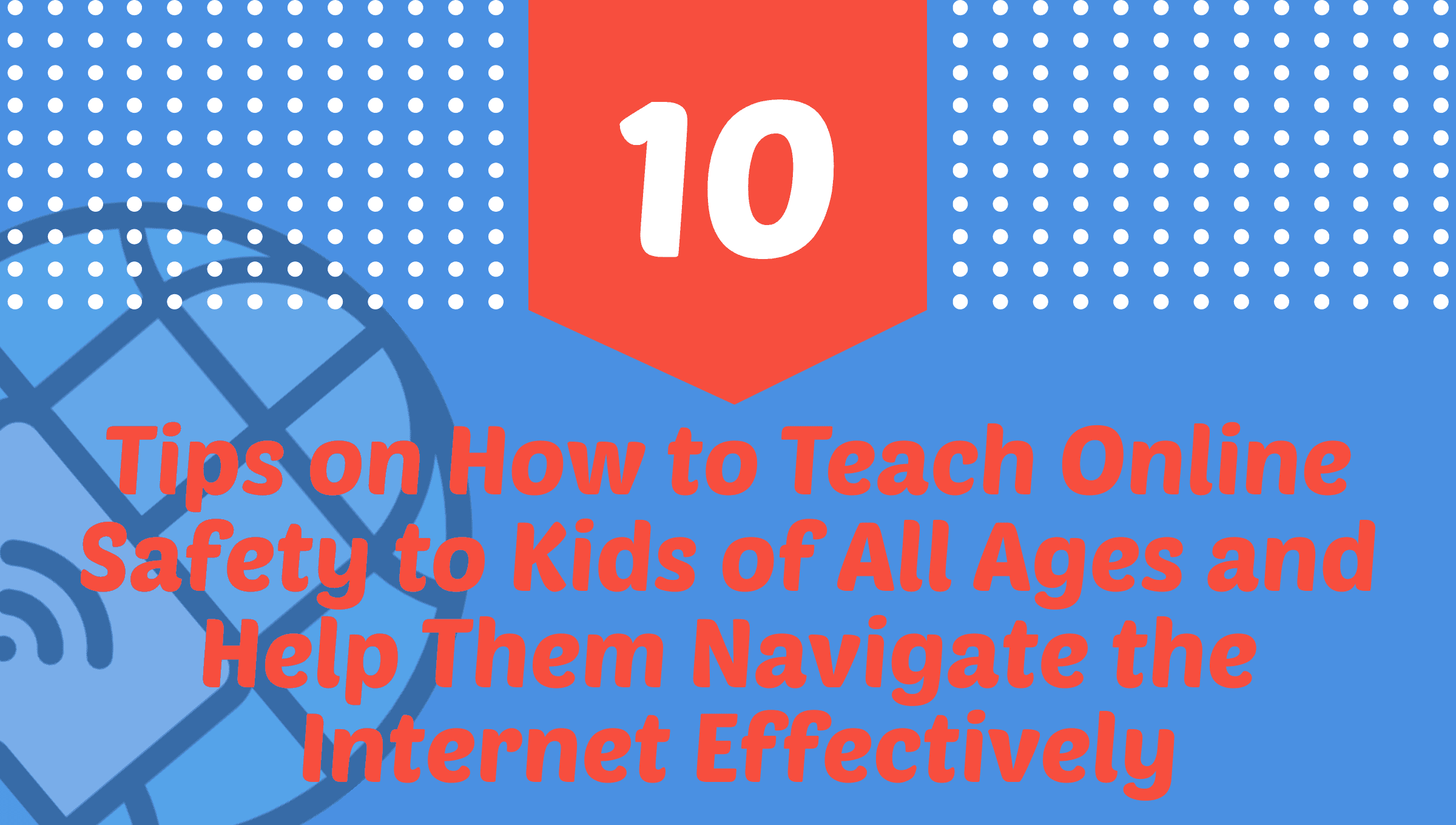
Early Childhood Education (ECE) refers to educational programs for young children from birth to around eight years old, supporting cognitive, physical, social, and emotional development. It includes various forms, like nursery schools and home-based care, with a focus on providing a nurturing environment for play-based learning, hands-on activities, and social interaction. Goals vary but often include promoting language and literacy skills, social skills, and emotional regulation to build a foundation for academic success and lifelong learning.
5 Reasons Why Early Childhood Education (ECE) is Important
- Brain Development
- Social and Emotional Development
- Academic Achievement
- Closing the Achievement Gap
- Lifelong Learning
Top 5 Benefits of Early Childhood Education
Here are the top five benefits of Early Childhood Education (ECE):
- Cognitive Development: ECE programs provide a stimulating and supportive environment that helps children develop cognitive skills, such as problem-solving, critical thinking, and language development. These skills are essential for academic success and lifelong learning.
- Social and Emotional Development: ECE programs help children develop social and emotional skills, such as self-regulation, empathy, and communication, which are crucial for building positive relationships and succeeding in school and beyond.
- School Readiness: ECE programs prepare children for formal schooling by providing them with the skills and knowledge they need to succeed in a classroom setting. This includes academic skills, such as literacy and numeracy, as well as social and emotional skills.
- Closing the Achievement Gap: ECE programs can help to reduce the achievement gap between children from different socioeconomic backgrounds, by providing access to quality education and support.
- Long-Term Benefits: Research has shown that children who attend high-quality ECE programs are more likely to succeed academically and socially in later years, and have better employment and earnings outcomes as adults. They are also less likely to engage in criminal activity or require social welfare support.
5 Things to Consider When Choosing a Preschool
When choosing a preschool for your child, there are several things to consider to ensure that you find the right one:
- Location: Consider the location of the preschool and whether it is convenient for you to drop off and pick up your child. Also, think about the safety of the neighborhood and the ease of transportation to and from the preschool.
- Curriculum: Look for a preschool with a curriculum that aligns with your values and goals for your child’s education. Consider the teaching methods, learning goals, and the types of activities and materials used in the classroom.
- Staff: Pay attention to the qualifications and experience of the teachers and staff. Look for a preschool with a low student-to-teacher ratio and a staff that is well-trained in early childhood education.
- Safety and Security: Ensure that the preschool has proper safety and security measures in place, including emergency plans, background checks for staff, and secure facilities.
- Parent Involvement: Consider the level of involvement that the preschool encourages from parents. Look for a preschool that values communication and collaboration between parents and staff.
The Role of Play in Early Childhood Education
Play is a fundamental aspect of early childhood education, contributing significantly to a child’s overall development. Incorporating play-based learning into educational programs enhances cognitive, social, and emotional growth. Understanding the role of play in early childhood education is crucial for parents seeking the best educational environment for their children.
1. The Power of Play in Cognitive Development
Play is not just a source of entertainment for young children; it is a powerful tool for cognitive development. Engaging in various forms of play, such as imaginative play, puzzles, and games, stimulates the brain, fostering skills like problem-solving, critical thinking, and creativity. A well-designed early childhood education program recognizes the importance of play in building a solid foundation for future academic success.
2. Fostering Social and Emotional Skills through Play
Play serves as a natural avenue for children to develop crucial social and emotional skills. Interacting with peers during play activities helps children learn about cooperation, sharing, and empathy. Play also provides a safe space for emotional expression and regulation, teaching children to navigate their feelings in a supportive environment. A preschool that prioritizes play-based learning is likely to contribute significantly to a child’s emotional intelligence.
3. Play as a Gateway to Academic Achievement
Contrary to a traditional perception that play and academics are separate entities, research indicates that play can be a gateway to academic success. Play-based learning introduces foundational concepts in a way that is engaging and memorable for young minds. Through activities that involve counting, reading, and problem-solving, children not only acquire knowledge but also develop a positive attitude towards learning.
4. Ensuring Inclusivity and Closing Gaps through Play
Play has the potential to bridge gaps in learning that may arise due to diverse socioeconomic backgrounds. In a play-centric environment, children from various backgrounds can interact and learn together, fostering inclusivity. Early childhood education programs that actively promote play can contribute to reducing the achievement gap by providing equal opportunities for all children to thrive.
5. Cultivating a Lifelong Love for Learning
The incorporation of play in early childhood education sets the stage for a lifelong love for learning. When children associate learning with enjoyable experiences, they are more likely to approach education with enthusiasm as they progress through their academic journey. A preschool that understands and values the role of play is an environment where children can develop a positive attitude towards continuous learning.
Choosing the Right Preschool: Beyond the Basics
While the location, curriculum, staff, safety, and parent involvement are essential considerations when choosing a preschool, delving deeper into the educational philosophy and approach to play can provide additional insights.
1. Educational Philosophy and Play Integration
Understanding the educational philosophy of a preschool is crucial. Some preschools may follow traditional models, while others may emphasize alternative approaches such as Montessori or Reggio Emilia. Consider how the chosen philosophy aligns with your beliefs about education and whether it integrates play as a central component of learning.
2. Observing Play Spaces and Resources
During the selection process, take the time to observe the play spaces and resources available in the preschool. An environment rich in diverse materials, both indoors and outdoors, suggests a commitment to providing varied and stimulating play experiences. Ensure that play is not an afterthought but an integral part of the learning environment.
3. Teacher Facilitation of Play
Inquire about how teachers facilitate play within the classroom. Effective play-based learning involves educators who understand the value of play in the learning process. Ask about the teacher’s role in guiding and enhancing play experiences, ensuring they strike a balance between fostering exploration and providing guidance when necessary.
4. Integration of Technology in Play
Consider the preschool’s approach to technology in play. While technology can be a valuable tool, it’s essential to ensure that it complements rather than replaces hands-on, imaginative play. A balanced approach that incorporates technology judiciously while prioritizing interactive, real-world experiences is indicative of a thoughtful and modern educational approach.
5. Parental Communication on Play-Based Learning
Inquire about how the preschool communicates with parents regarding their child’s play-based learning experiences. Transparent and regular communication about the activities and skills developed through play provides parents with valuable insights into their child’s progress and fosters a collaborative relationship between home and school.
By exploring these additional aspects when selecting a preschool, parents can ensure that their child’s early education experience is not only comprehensive but also aligned with the principles of play-based learning. The next section will explore the importance of parental involvement in early childhood education and its positive impact on a child’s overall development.
The Crucial Role of Parental Involvement in Early Childhood Education
Parental involvement is a key factor in maximizing the benefits of early childhood education. When parents actively participate in their child’s learning journey, the impact extends beyond the classroom. Here are some ways in which parents can contribute to and enhance their child’s early education experience:
1. Understanding the Curriculum and Play-Based Learning Activities
Engage with the preschool’s curriculum and play-based learning activities. Attend orientation sessions, workshops, and parent-teacher meetings to gain insights into the educational approach. Understanding the curriculum allows parents to support and reinforce the learning experiences at home, creating a seamless connection between school and family life.
2. Extending Play Experiences at Home
Build on the play experiences introduced at school by incorporating similar activities at home. Whether it’s engaging in imaginative play, reading together, or experimenting with hands-on projects, these activities reinforce the skills and concepts introduced in the classroom. Shared play experiences also strengthen the parent-child bond.
3. Effective Communication with Educators
Establish open lines of communication with preschool educators. Regularly discuss your child’s progress, interests, and any concerns you may have. This partnership ensures that parents are informed about their child’s development and enables educators to tailor their approach to the child’s individual needs.
4. Creating a Learning-Friendly Environment at Home
Set up a home environment that encourages learning. Provide a variety of age-appropriate books, puzzles, and educational games. Designate spaces for creative play and exploration. A home environment that values and supports learning reinforces the importance of education in a child’s mind.
5. Participating in School Events and Activities
Attend school events and actively participate in activities organized by the preschool. Whether it’s a playdate, a school performance, or a parent-child workshop, these events foster a sense of community among parents and provide additional opportunities for children to socialize and learn in different contexts.
Conclusion
In conclusion, early childhood education is a crucial phase in a child’s development, laying the foundation for future academic success and lifelong learning. Understanding the significance of play in this context is essential for parents seeking the best educational environment for their children. Play-based learning not only enhances cognitive skills but also fosters social and emotional development, creating a well-rounded educational experience.
When choosing a preschool, parents should go beyond the basics and consider the institution’s educational philosophy, approach to play, and the integration of technology. Additionally, parental involvement plays a pivotal role in maximizing the benefits of early childhood education. By actively engaging with the curriculum, extending play experiences at home, maintaining effective communication with educators, creating a learning-friendly environment, and participating in school events, parents contribute significantly to their child’s educational journey.
In essence, the synergy between a well-designed early childhood education program, play-based learning, and active parental involvement sets the stage for a positive and enriching educational experience. As parents and educators collaborate to support children in their formative years, the potential for academic success, social competence, and a lifelong love for learning becomes not just a possibility but a tangible reality.



